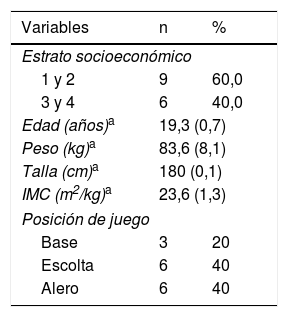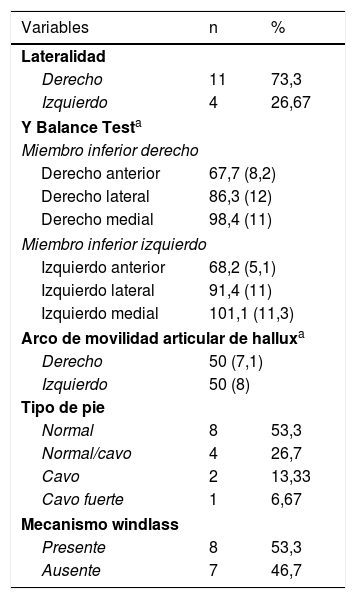En el baloncesto las articulaciones de los miembros inferiores están constantemente sometidas a cambios de dirección, fuerzas de cizallamiento y presión constante, poniendo en riesgo de presentar lesiones. La deficiencia en el equilibrio dinámico se ha definido como un factor de riesgo para lesiones de rodilla y tobillo en estos deportistas; de la misma manera se han atribuido posibles riesgos lesionales a las características morfológicas del pie.
ObjetivoEl objetivo del presente trabajo fue identificar la relación entre algunas características del pie y el equilibrio dinámico en deportistas de la liga vallecaucana de baloncesto categoría sub-19.
Materiales y métodosCuenta con un diseño descriptivo de tipo correlacional y corte transversal, realizado entre el último trimestre de 2019 y el primer trimestre de 2020. Quince jóvenes pertenecientes a la liga vallecaucana de baloncesto participaron en el estudio, con una masa promedio de 83,6±8,1kg, edad promedio de 19,3±0,7 años y una altura promedio de 180±0,8cm. Las variables de estudio fueron extraídas de los modelos teóricos científicos. Se analizaron las características sociodemográficas, la estabilidad dinámica medida con el Y Balance Test, el tipo de pie con el método Herzco y la presencia del mecanismo de windlass.
ResultadosLas características del pie se dividieron entre lateralidad y tipo de pie. El 73,3% son diestros y el 26,67% zurdos. Tipo de pie: normal, 53,3%; normal/cavo, 26,7%; cavo, 13,33%; cavo/fuerte, 6,67%. La relación entre el resultado corregido del Y test y el tipo de pie fue: p=0,728 en miembro inferior derecho y p=0,48 en miembro inferior izquierdo.
ConclusionesEl presente trabajo señala que en la población estudiada no se encuentra relación entre las características del tipo de pie, el equilibrio dinámico y la presencia del mecanismo de windlass. Sin embargo, son necesarios más estudios que puedan aislar otros factores que pudieran estar determinando la incidencia en el equilibrio.
In basketball, the joints of the lower limbs are constantly subjected to changes in direction, shear forces and constant pressure, putting them at risk of injury. Dynamic balance deficiency has been defined as a risk factor for knee and ankle injuries in these athletes, and possible injury risks have been attributed to the morphological characteristics of the foot.
ObjectiveThe objective of the present work was to identify the relationship between some characteristics of the foot, presence of the windlass mechanism and dynamic balance in sportsmen of the Vallecaucana Basketball League, under 19 category.
Materials and methodsThe research study design was descriptive, correlational and cross-sectional, carried out between the last quarter of 2019 and the first quarter of 2020. Fifteen youths from the Vallecaucana Basketball League participated in the study, with an average mass of 83.6±8.1kg, average age of 19.3±.7 years and average height of 180±.8cm. The study variables were extracted from the theoretical scientific models. Sociodemographic characteristics, dynamic stability measured with the Y Balance Test, type of foot with the HERZCO method and presence of the windlass mechanism.
ResultsThe characteristics of the foot were divided between laterality and type of foot. Of the players, 73.3% were right-handed and 26.67% left-handed. Type of foot: Normal 53.3%, Normal/cavus 26.7%, cavus 13.33%, cavus/strong 6.67%. Relationship between the corrected result of the Y test and type of foot: p=.728 in lower right limbs and p=.48 lower left limb.
ConclusionsThe present work indicates that in the population studied there is no relationship between the characteristics of type of foot, dynamic balance and presence of the windlass mechanism. However, more studies are needed that can isolate other factors that could determine the impact on balance.
Article
Si ya tiene sus datos de acceso, clique aquí.
Si olvidó su clave de acceso puede recuperarla clicando aquí y seleccionando la opción "He olvidado mi contraseña".









